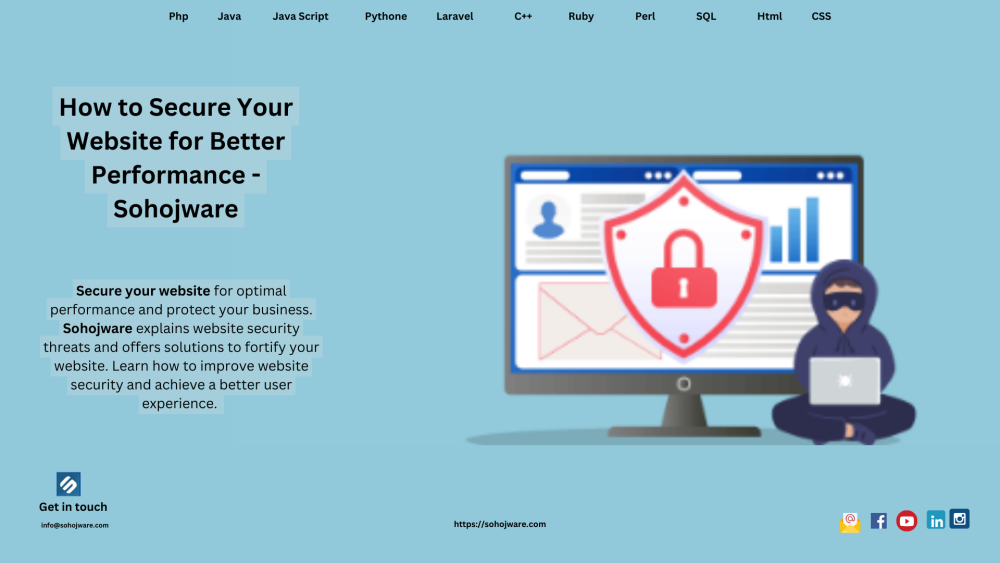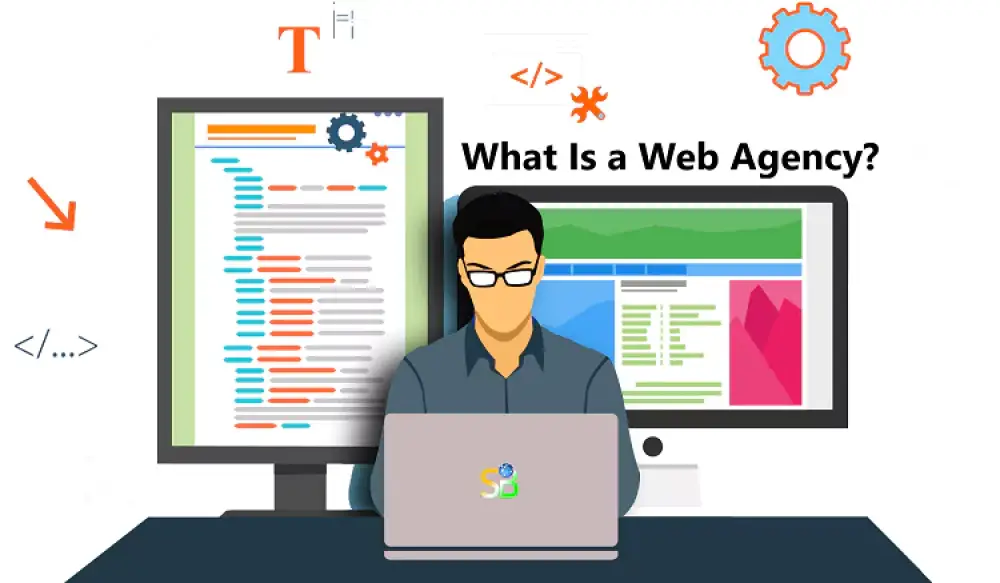A website is more than simply an online presence in the modern digital era; it's an essential tool for companies of all sizes. It serves as your online storefront, a communication channel, and a central point for lead and sales generation. However, your website also requires strong security measures to operate at peak efficiency and secure sensitive data, just like a physical business does. This is because inventory and customers are at risk.
Website security is more than just thwarting harmful assaults; it also involves building visitor confidence and making sure your website runs smoothly. Better website performance and strong website security work hand in hand, resulting in a satisfying user experience and, eventually, a prosperous online presence.
Sohojware, a leading web development company, understands website security's critical role in your online success. This article will explore the importance of website security, the different threats you may encounter, and the steps you can take to secure your website for optimal performance.
Why is Website Security Important?
Website security is crucial for several reasons:
-
Protects Your Data and Information: Your website likely stores sensitive information such as customer data, contact details, and even financial information. A secure website safeguards this data from unauthorized access, preventing breaches and protecting your visitors' privacy.
-
Prevents Malware Attacks: Malicious actors can inject malware onto your website, which can infect visitors' devices and steal data. Strong website security helps prevent these attacks, ensuring a safe browsing experience for your visitors.
-
Maintains Website Reputation: A website security breach can severely damage your reputation. It can erode customer trust, negatively impact search engine rankings, and ultimately, hurt your business.
-
Improves Website Performance: Security vulnerabilities can slow down your website and make it sluggish. A secure website operates more efficiently, leading to faster loading times and a better user experience.
-
Enhances SEO Rankings: Search engines like Google prioritize secure websites. Strong website security can improve your search engine ranking, making your website more visible to potential customers.
By implementing powerful website security measures, you can achieve these benefits and create a safe and reliable online environment for your business and your visitors.
Common Website Security Threats
Several threats can compromise your website's security. Here are some of the most common ones:
-
SQL Injection Attacks: These attacks exploit vulnerabilities in your website's database to steal or manipulate data.
-
Cross-Site Scripting (XSS): XSS attacks inject malicious scripts into your website that can steal user data or redirect them to phishing sites.
-
Phishing Attacks: These attacks attempt to trick users into revealing sensitive information by mimicking legitimate websites or emails.
-
Denial-of-Service (DoS) Attacks: DoS attacks overwhelm your website with traffic, making it unavailable to legitimate users.
-
Malware: Malicious software can be injected into your website and infect visitors' devices, stealing data or disrupting their browsing experience.
Sohojware recommends staying informed about the latest website security threats and implementing appropriate measures to mitigate these risks.
Steps to Secure Your Website

Here are some key steps you can take to secure your website:
-
Use Strong Passwords: Always use complex and unique passwords for your website's admin panel and other login credentials. Consider using a password manager to generate and store strong passwords.
-
Implement SSL/TLS Encryption: Secure Sockets Layer (SSL) or Transport Layer Security (TLS) encryption creates a secure connection between your website and visitors' browsers. This encrypts data transmission, protecting sensitive information like credit card details.
-
Keep Your Website Software Updated: Outdated website software often contains vulnerabilities that hackers can exploit. Regularly update your website's core software, plugins, and themes to address known security issues.
-
Regularly Backup Your Website: In case of a security breach, having a recent backup of your website allows you to restore it quickly and minimize downtime.
-
Use a Web Application Firewall (WAF): A WAF acts as a security barrier, filtering out malicious traffic and protecting your website from common attacks.
-
Educate Your Staff: Security awareness training for your staff can help them identify and avoid phishing attempts and other social engineering tactics.
Sohojware offers comprehensive website security solutions that include these measures and more. Our team of experienced developers can assess your website's security posture, identify vulnerabilities, and implement robust security measures to protect your website and your data.
FAQs
Here are some frequently asked questions about website security, answered by the experts at Sohojware:
-
How often should I update my website's security software?
Sohojware recommends updating your website's security software as soon as updates become available. These updates often include critical security patches that address newly discovered vulnerabilities. Ideally, you should configure automatic updates for your website's core software, plugins, and themes whenever possible.
-
What if I need more time or expertise to manage my website's security?
Sohojware understands that managing website security can be a complex task. We offer website security maintenance plans that include regular security audits, vulnerability scanning, malware detection and removal, and ongoing monitoring to ensure your website remains secure.
-
How can I tell if my website has been hacked?
-
Several signs may indicate your website has been hacked. These include:
-
Slow website loading times
-
Unusual activity in your website analytics
-
Modified website content or files
-
Unexplained spikes in traffic
-
Warning messages from your web hosting provider
-
If you suspect your website has been hacked, contact Sohojware immediately. Our team can help you investigate the breach, remove any malware, and restore your website security.
-
What are the costs associated with website security?
The cost of website security can vary depending on the size and complexity of your website, as well as the level of security you require. Sohojware offers a range of website security solutions to fit your budget. We believe that website security is an essential investment for any business that operates online.
-
How can Sohojware help me secure my website?
-
Sohojware offers a comprehensive suite of website security services, including:
-
Security audits and vulnerability assessments
-
Malware detection and removal
-
Website application firewall (WAF) implementation
-
Security patching and updates
-
Ongoing security monitoring and maintenance
Our team of experienced security professionals can help you develop a customized website security plan that meets your specific needs.
By taking proactive steps to secure your website, you can protect your valuable data, ensure a positive user experience for your visitors, and achieve your online business goals. Contact Sohojware today to discuss your website security needs and learn how we can help you create a safe and secure online presence.




